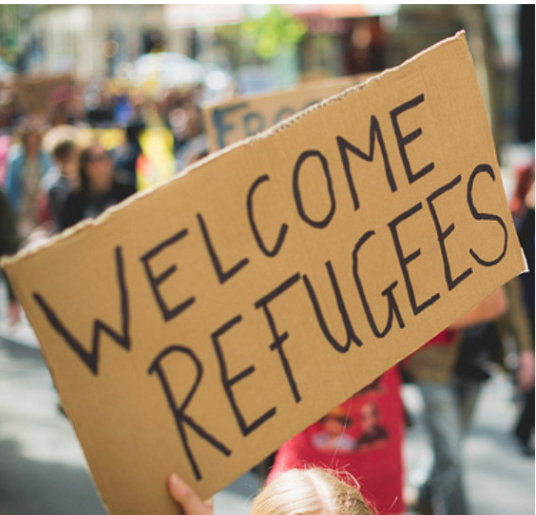Introduction
Millions of people flee from their home countries every year, seeking safety from persecution, war, or any natural calamities. Yet, instead of finding a home in another country, they end up facing a lot of challenges. The term “refugee” has always had a negative connotation because of the various issues a nation faces due to refugees. But the actual victims here are the refugees themselves. They are the people in a new country, wondering about their rights and facing an existential crisis. According to the United Nations High Commissioner for Refugees (UNHCR), “Refugees are people who have fled their countries to escape conflict, violence, or persecution and have sought safety in another country.”[1]
Aspects of the Refugee Crisis
The host country faces a variety of issues due to refugees. The first and foremost considerable issue is overpopulation. For the host country, this ‘extra’ population is not just one problem but a root cause of many others. Overcrowded cities with makeshift settlements result in the development of slums that further hamper the development of that city. Depending on the rights they are eligible for in different countries, they may or may not get access to employment. This population is a group of jobless people consuming resources until then. Both the government and the country’s tax-paying inhabitants are burdened by that. As a result, the refugee crisis may cause resource scarcity, the growth of slums, unemployment, social instability, and security problems. Furthermore, higher crime rates brought on by unemployment may compromise national security. Thus, issues like resource scarcity, slum housing, unemployment, social unrest, and concerns about peace and security can be attributed to the growing population. There is a flip side of the coin too.
The problems that these refugees face are far more severe than those faced by the host country. These problems are more related to human rights than just a problem of the state. They flee from
their home country because they fear persecution or some kind of severe threat due to war or some kind of social or political unrest or sometimes even due to natural calamities.
The host country is usually culturally different from their home country and thus, they often end up feeling socially and culturally marginalized.
With a feeling of lack of social security and an existential crisis, they continue to live in poverty in unfamiliar places. Unemployment and poverty are not their choice but they have to bite the bullet and work as cheap labor. Deprived of basic human rights, these people are vulnerable to exploitation, which may be financial, sexual, physical, psychological,etc. And amidst such hardships, the pursuit of justice remains elusive.
With that tug-of-war between refugees causing issues and refugees facing issues, human rights come into action. Every country recognizes different kinds of rights for refugees but they are all based on the common ground of humanity.
India’s Laws & Policies on Refugees
India being a shelter of approximately 4,05,000 refugees[2] from various South Asian countries and many other corners of the world, has no particular law governing the refugees. India is not a signatory of the 1951 Refugee Convention of the United Nations. This convention laid down the basic principles for the treatment of refugees and one of its core principles was non-refoulement which suggests that no refugee must be deported back to the country from where he fled due to fear of life or freedom. India always had an ad hoc approach to refugee settlement since its independence. There is no defined legislature but the provisions of various statutes provide the legal status of the refugee.
The various statutes related to refugees are:
- Citizenship Act, 1955 (No.57 of 1955)
- Extradition Act, 1962 (No. 34 of 1962)
- Foreigners Act, 1946 (No.31 of 1946)
- Illegal Migrant (Determination by Tribunals) Act, 1983 (No.39 of 1983)
- India Penal Code Act, 1860 (No.45 of 186
- Passport Act, 1967 (No.15 of 1967)
- Protection of Human Rights Act, 1993 (No.10 of 1994)
- Registration of Foreigners Act, 1939 (No.16 of 1939)[3]
Apart from these various articles of the Indian Constitution regarding Citizenship such as Articles 5,6,7,8,9 and other Articles providing basic human rights to even non-citizens, govern the refugees.
The Legal Status of Refugees
Refugees are categorized as ‘Aliens’ under Section 3(2)(b) of the Indian Citizenship Act, 1955[4], complicating their status as they are given foreign treatment according to the term alien and according to the Foreigners Act, 1946 any foreigner on the Indian land can be arrested and deported to their home country. The Foreigners Act gives the authorities the power to arrest any foreigner merely on suspicion of non-compliance with the law. These provisions and the legal status of refugees contradict the basic human rights principle of non-refoulement as given in the 1951 convention.
Being a non-citizen of the country, the refugees do not enjoy complete constitutional rights as the citizens of that country do.
They are deprived of the Fundamental Rights and other constitutional rights provided in:
Article 15[5] prohibits discrimination based on religion, race, caste, sex, or place of birth, a basic human right. Refugees are unprivileged in this right. Article 16[6] ensures equal opportunity in public employment. Article 19[7] protects freedom of speech, but refugees suffer due to deprivation. Article 29[8] protects the interests of minorities, including their right to conserve culture and language, and to establish and administer educational institutions. Article 30[9] protects minority rights to establish and administer educational institutions. However, refugees are deprived of these rights
These Fundamental Rights are reserved only for the citizens of the country. This is due to the political history of India that the constitution makers have reserved the rights to various freedoms to only citizens. Apart from these, all the other rights in the Part III of the Indian Constitution are available to all the people present in the territory of India and are not necessarily reserved only for citizens. The various rights such as the:
- Article 14- right to equality before law and equal protection of laws.[10]
- Article 20- right to protection in respect to conviction for offences.[11]
- Article 21- right to protection of life and personal liberty.[12]
- Article 22- right to protection against arrest and detention in certain cases.[13]
- Article 23- prohibition of traffic in human beings and forced labour.[14]
- Article 24- prohibition of employment of children in factories etc.[15]
If the refugees want access to these rights that are reserved for the citizens, they first need to be a citizen of India. The provision regarding citizenship for refugees is laid down in Section 6 of the Citizenship Act 1955[16]. This section allows a person to acquire citizenship through the process of naturalization. It states that if a person who is not a citizen of India and neither are his parents wants to acquire citizenship, he must have lived in the country for an aggregate of 11 years in the period of the past 14 years and must not be an illegal immigrant. (According to general provisions of the Citizenship Act 1955, an illegal immigrant is a person who enters the country without valid documents or who has visited the country with legal documents but overstayed the term of his visa.)
However, this term of 11 years has been reduced to 5 years for the religious minorities including Sikhs, Jains, Parsis, Hindus, Christians or Buddhists from Afghanistan, Bangladesh, and Pakistan through an amendment in the Citizenship Amendment Act 2019[17].
The Role of Judiciary in Protecting the Rights of Refugees
In the absence of comprehensive legislation, the judiciary plays a crucial role in safeguarding refugee rights. Time and again, in various judgments, the interpretation of various Constitutional and human rights has helped many refugees exercise their rights in India. These judgments set a brilliant example of India recognizing the rights of every person in need.
Looking at a few such instances, we see in the case of Majid Ahmed Abdul Majid Mohd Jad Al Hak v. Union of India[18], The High Court of Delhi laid down that necessities like food and medicines must be provided to the refugees who are in detention.
Similarly, in Malvika Karelkar v. Union of India[19], the deportation order issued against twenty-one Burmese refugees on the grounds of suspicion was stayed by the Supreme Court and permission to seek refugee status under UNHCR was granted to them.
Conclusion
The absence of dedicated legislation leads to misinterpretations, jeopardizing refugee rights. Despite this, the judiciary has consistently protected the rights of refugees, setting a commendable example of India’s commitment to assisting those in need. Various cases have set an example of India helping everyone in need. However, the need for proper legislation remains unsatisfied. By enacting specific laws for refugees, India can better address their challenges and provide them with the necessary support until they can safely return home or integrate into Indian society. This approach would not only uphold their basic human rights but also offer them a sense of belonging and security.
By Meet Talreja, 4th Year B.A. LL.B (Hons.), Faculty of Law, The Maharaja Sayajirao University of Baroda, Vadodara


Leave a Reply